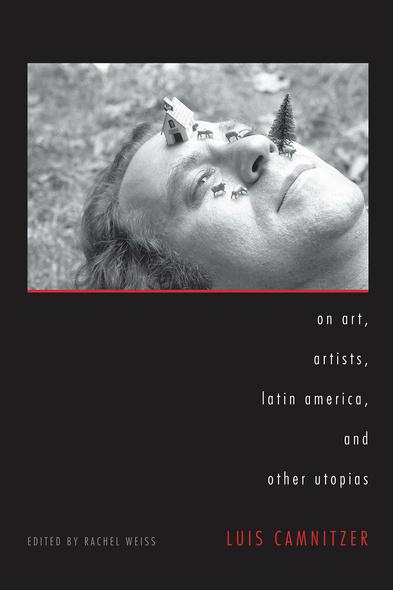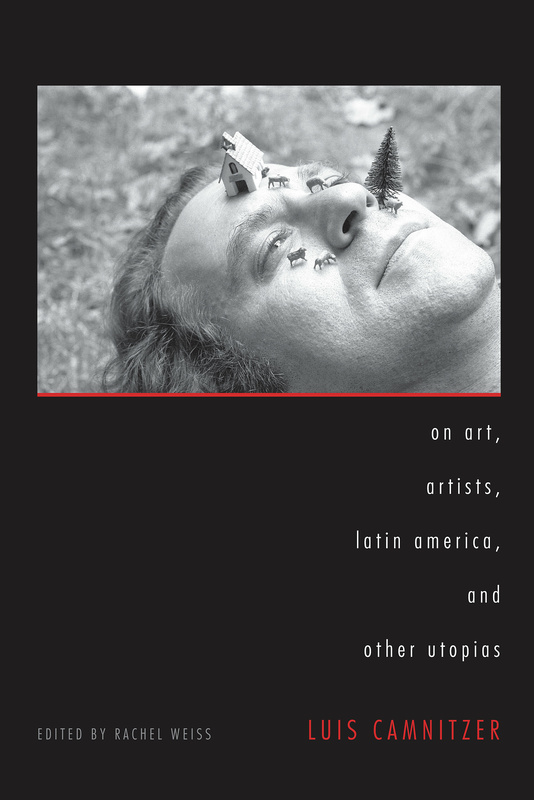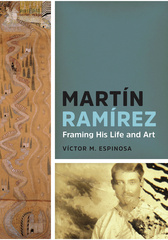Our shopping cart is currently down. To place an order, please contact our distributor, UTP Distribution, directly at utpbooks@utpress.utoronto.ca.

On Art, Artists, Latin America, and Other Utopias
Artist, educator, curator, and critic Luis Camnitzer has been writing about contemporary art ever since he left his native Uruguay in 1964 for a fellowship in New York City. As a transplant from the "periphery" to the "center," Camnitzer has had to confront fundamental questions about making art in the Americas, asking himself and others: What is "Latin American art"? How does it relate (if it does) to art created in the centers of New York and Europe? What is the role of the artist in exile? Writing about issues of such personal, cultural, and indeed political import has long been an integral part of Camnitzer's artistic project, a way of developing an idiosyncratic art history in which to work out his own place in the picture.
This volume gathers Camnitzer's most thought-provoking essays—"texts written to make something happen," in the words of volume editor Rachel Weiss. They elaborate themes that appear persistently throughout Camnitzer's work: art world systems versus an art of commitment; artistic genealogies and how they are consecrated; and, most insistently, the possibilities for artistic agency. The theme of "translation" informs the texts in the first part of the book, with Camnitzer asking such questions as "What is Latin America, and who asks the question? Who is the artist, there and here?" The texts in the second section are more historically than geographically oriented, exploring little-known moments, works, and events that compose the legacy that Camnitzer draws on and offers to his readers.
After years of attacking from the margins, Luis Camnitzer is now, ironically, a bona fide "international artist," whose work has appeared in the Venice Biennial, Documenta 11, the Whitney Biennial, and several Havana Biennials. A professor emeritus at SUNY College at Old Westbury, Camnitzer presently is the pedagogical curator for the Iberé Camargo Foundation in Brazil. He is the author of several books, including Conceptualism in Latin American Art: Didactics of Liberation. He lives in Great Neck, New York.
Rachel Weiss is Professor of Arts Administration and Policy at the School of the Art Institute of Chicago. She is the author of several books, including To Build the Sky: To and From Utopia in the New Cuban Art.
- Foreword by Rachel Weiss
- Part I: On and Against Translation
- Introduction
- 1. Contemporary Colonial Art (1969)
- 2. The Sixties (1998)
- 3. Exile (1983)
- 4. Political Pop (1998)
- 5. Access to the Mainstream (1987)
- 6. Wonder Bread and Spanglish Art (1989)
- 7. Cultural Identities Before and After the Exit of Bureau-Communism (1991)
- 8. Art and Politics: The Aesthetics of Resistance (1994)
- 9. The Artist's Role and Image in Latin America (2004)
- 10. Out of Geography and Into the Moiré Pattern (1996)
- 11. The Reconstruction of Salami (2003)
- 12. Printmaking: A Colony of the Arts (1999)
- 13. My Museums (1995)
- 14. The Forgotten Individual (1996)
- 15. Free-trade Diaspora (2003)
- Part II: Other Histories
- Introduction
- 16. Pedro Figari (1991)
- 17. Resoftenings and Softenings in Uruguayan Art (1991)
- 18. An Ode to Aquatint (2003)
- 19. Revisiting Tautology (2006)
- 20. The Museo Latinoamericano and MICLA (1992)
- 21. Flying in Weightlessness (2004)
- 22. Brazil in New York (2001)
- 23. The Keeper of the Lens (2005)
- 24. The Two Versions of Santa Anna's Leg and the Ethics of Public Art (1995)
- 25. The Biennial of Utopias (1999)
- 26. Introduction to the Symposium "Art as Education/Education as Art" (2007)
- Index





